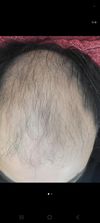community Feel like I’ve added everything to my routine that I could and it’s not fully working. Anything else I could add?
Hair loss treatments used include dutasteride, oral and topical minoxidil, stemoxydine, microneedling, and red light therapy. Despite these treatments, the person is still losing hair around temples at age 22.
